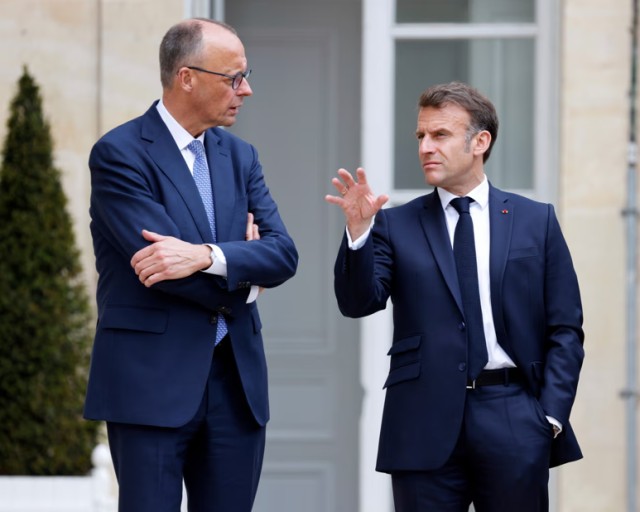
Friedrich Merz, left, and Emmanuel Macron have promised to set up a joint Franco-German defence and security council. Photograph: AP
In a significant move for European unity, French President Emmanuel Macron and newly appointed German Chancellor Friedrich Merz have vowed to strengthen the Franco-German relationship. Their goal: to address Europe’s growing security and economic challenges by working “systematically together” in what they call a "new push for Europe."
A Fresh Start for Europe’s Powerhouses
Merz emphasized the need for a reset in Franco-German relations, stressing that this was essential for Europe’s security and competitiveness. Speaking at a joint press conference in Paris, he underlined the importance of both countries standing united. “Only through deeper collaboration can we overcome the enormous challenges that lie ahead,” Merz said.
Joint Defence Council and Economic Reforms
One of the key initiatives discussed was the creation of a joint Defence and Security Council. This body will meet regularly to ensure stronger defence cooperation between the two nations. In addition to military efforts, the leaders also plan to coordinate economic reforms, an essential step in ensuring Europe's future stability.
The announcement comes at a crucial time for Europe, which has seen the once-powerful Franco-German engine stall. Years of infighting and lack of action within the former Chancellor Olaf Scholz's coalition had stalled progress, leaving both countries in need of fresh leadership.
Merz’s European Leadership Vision
Friedrich Merz took office as Chancellor after a rocky start, but his vision for Germany’s role in Europe is clear. His goal is to restore Germany's leadership and contribute actively to shaping European policy. “What Europe needs now is leadership from Germany—leadership that shapes, not just observes,” said Jana Puglierin, a senior analyst at the European Council on Foreign Relations (ECFR).
Merz's commitment to European values is a breath of fresh air after years of internal political struggles in Germany. His plan to centralize foreign and European policy in the chancellery is seen as a move towards greater coherence in Germany's approach to international relations.
Strengthening EU Defence Capabilities
As the war in Ukraine continues to dominate European security concerns, Merz called on all EU members to increase their defence spending. “Only by closing our capability gaps can we fully support Ukraine,” he asserted. Merz also expressed a desire to discuss nuclear deterrence with France and the UK, highlighting the importance of coordinated efforts in ensuring Europe's security.
Furthermore, Merz plans to consult intensively with France, the UK, and Poland regarding Ukraine’s future. The Chancellor sees these nations as vital players in navigating the ongoing conflict and securing long-term peace.
A Unified Front for Ukraine
Macron and Merz are aligned on their unwavering support for Ukraine. Both leaders reiterated their commitment to helping Ukraine in its struggle against Russian aggression. “The question now is whether Russia is ready for a ceasefire lasting at least 30 days,” said Macron, stressing that such a move would be essential for laying the foundation for a lasting peace.
Merz shared his optimism for a ceasefire, though he cautioned that the involvement of the United States would remain crucial in any peace process. “Europe cannot substitute the role of the US in this conflict,” he noted.
A Stronger Franco-German Partnership
Observers believe that the relationship between Macron and Merz will be far more productive than the one between Macron and former Chancellor Scholz. Merz, with his business background and staunch support for Ukraine, is seen as a more reliable partner for Macron.
Macron, acknowledging the potential of this new partnership, congratulated Merz on his appointment. He expressed optimism about strengthening the Franco-German motor, which could accelerate Europe’s journey toward greater sovereignty, security, and competitiveness.
Looking to the Future
With Merz now in office, Germany is positioning itself to play a more active role in European and global affairs. The new coalition agreement emphasizes strengthening ties with France and Poland, aiming for a united front on key European policies. The three countries plan to closely align their strategies to ensure they act together for the benefit of the entire European Union.
This renewed commitment between France and Germany signals the beginning of a new era for Europe. The two countries, traditionally the engine of European integration, are poised to lead the continent through its most significant challenges yet.















